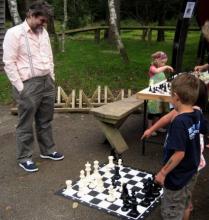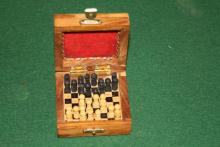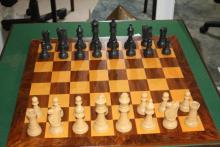I've been doodling with a piece over at DJCA about calculation and as part of that task I watched a few YouTube videos about how to calculate. Almost none of these actually tell you how to calculate, although several do show you.
Here's one for you to think about from Black's point of view:
All done?
Here's the Black player's account:
https://www.youtube.com/watch?v=B9JqyCJtjV0&t=1104s
I dunno Andras, that's not a model of calculation for me, but we can find some nuggets:
1. Lots of good points are made in the video:
You have to evaluate the position at the end of your variations
Calculate in your opponent's time
Go right back to the start if you make a mistake
I also like the 'living in the future' framing (earlier in the video). Chess is a game that doesn't care at all about the past, and not much about the present.
2. But some reflections: "Your job is not to prove yourself correct, your job is to find the truth". (https://youtu.be/B9JqyCJtjV0?t=707). Truth is good, but sometimes you go from scientist to lawyer -- not gathering evidence to form a theory about what is the best move, but making a case for a move that you want to make work. Toth's analysis here seems a clear example of the latter, and I think the first two could also fit under that category. It would have been nice to have some commentary about when that approach is best and when it is not appropriate. In the first two examples in the video, the students played too cautiously. The failures were not in the analysis but the willingness to analyse at all, as the critical moves (d4-d5 and O-O-O) were not examined -- I imagine because their assessment of the position was undervalued, and they were not looking for the maximising move, a move more in keeping with a promising and dynamic position. Your job, in fact, is not to find the truth, but the best (least worst) move. A scientist's attitude is important: can I disprove my idea? (falsification) But you can and often do start with a favourite that you hope works.
3. As it happens, 19...Kh7 isn't the best move. It worked out well, but Stockfish greatly prefers 19...f6. Maybe 19...Kh7 is a more human choice, and it produced a OK outcome at the end of the day. But that alternative was worth pointing out too, if only to explain why it was rejected, or that it wasn't considered.
4. This 'one main line' approach I think is also unusual. What alternatives for White after 19...Kh7 were worth looking at? 20.Bxh5 is surely critical, and if you can make that work, then you're probably good to go, but maybe White can ignore the Nh5 and make trouble elsewhere, so you need to check. We didn't hear about any of that. Stockfish says 20.Rad1 is best for White (somewhere between = and =+) and probably good enough for a draw; if Black needs a win he might need to find 19...f6, creating an immediate crisis for the stranded Bishop.
5. The final error (avoiding 32...Qxf2 because of 'ghosts' after 33.Qg6+) didn't make a difference in a very favourable position (because White resigned!), but it's important: the final evaluation should have been "I'm an exchange up".
6. Nearly everyone recommends 'one last check' of the analysis before commitment, and I didn't hear it once from Toth.
There's quite a nice body of examples building up at the Chess Dojo on YouTube, but here too the wheat may be delivered slowly among a deal of chaff:
https://www.youtube.com/watch?v=5TQR91Mwqq0 (stepping stone method)
https://www.youtube.com/watch?v=aFsELcwDBB0 (stopping short, naïve assumptions. trying to make things work)
https://www.youtube.com/watch?v=pzhiqSyv8v4 (prioritising, losing track of main line, short cuts from evaluations)
https://www.youtube.com/watch?v=bokraF0RzLs (advanced examples, trying to make things work (again!))
The capacity to calculate seems inadequate without a sound judgement about when to try and make a line work by looking deeper.
The complete game:
[Event "Budapest FS07 GM"]
[Site "Budapest"]
[Date "2022.11.24"]
[Round "11"]
[White "Kristjansson, Stefan"]
[Black "Toth, Andras"]
[Result "0-1"]
[ECO "B85"]
[WhiteElo "2428"]
[BlackElo "2401"]
[PlyCount "64"]
[EventDate "2022.??.??"]
1. e4 c5 2. Nf3 d6 3. d4 cxd4 4. Nxd4 Nf6 5. Nc3 Nc6 6. Be2 e6 7. Be3 a6
8. O-O Qc7 9. f4 Be7 10. Kh1 O-O 11. Qe1 Nxd4 12. Bxd4 b5 13. e5 dxe5 14. Bxe5
Qb6 15. Bd3 Bb7 16. Qh4 h6 17. Qg3 Nh5 18. Qh3 g6 19. Be2 {[#]} Kh7 (19... f6
$1 20. Qd3 Ng7 21. Bd4 Qd8 (21... Qd6)) 20. Bxh5 $6 (20. Rad1) 20... gxh5 21.
Qxh5 f6 22. f5 Rg8 23. Bg3 Qc6 24. Rf2 b4 25. Ne2 Bc5 26. Rf3 Rg5 27. Qf7+ Rg7
28. Qh5 e5 29. Raf1 Qe4 30. Ng1 Qxc2 31. R3f2 Bxf2 32. Rxf2 Qe4 {0-1 Black
wins.} 0-1





























































